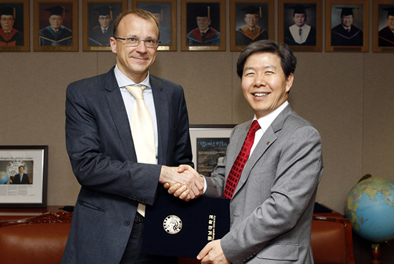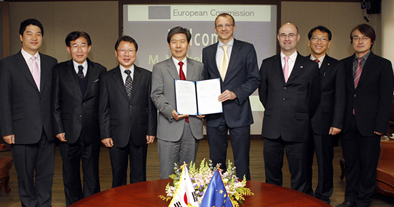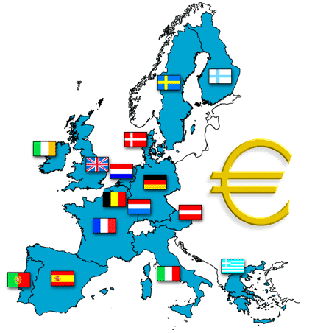4th following Seoul National University, Yonsei University and Pusan National University
Fostering talents who are acquainted with Europe before the coming Korea-EU FTA
[Dec 6, 2010]
Yeungnam University (president Lee, Hyo-soo) invited the 'EU Center', which will be supported by the European Union. Thus, Yeungnam University will foster students who are acquainted with Europe the Korea-EU FTA going into effect.

After signing the protocol on the establishment and operation of the 'YU-EU Center', President Lee, Hyo-soo hands over the protocol to Uwe Wissenbach of the EU executive committee.

Yeungnam University signed the 'Protocol on the Establishment and Operation of the EU Center' (photo) with the EU executive committee. Thus, Yeungnam University became the fourth university which hosts the 'EU Center' in Korea.
The EU will provide 600,000 Euros (app. 900 million won) for 4 and a half years to Yeungnam University to strengthen education and research on the EU, and it is also planning to utilize it as a base for improving cooperation between the Asia·Pacific region and the EU.
Currently, the EU executive committee has established the EU Center at major cities around the world including 10 in the US, 4 in Canada, 3 in Korea, 3 in Japan, 3 in Australia, and 1 in Singapore for the purpose of improving cooperation in politics and economics with the 27 nations of the EU. In Korea, EU Centers have been established and operated at Seoul National University in 2006, and Yonsei University and Pusan National University in 2008.

Yeungnam University will open the 'YU-EU Center' early next year and it will offer specialized educational opportunities by opening courses and developing Interdisciplinary major related to the EU. At the same time, it is planning to foster European leaders by strengthening academic exchange with universities of the 27 nations of the EU.
Also, it is planning to offer majors in European studies with dual degree programs in undergraduate, interlinked Programs of masters and doctoral degrees, while offering an average of 36 classes per semester. Furthermore, it will offer internet classes and pursue exchange programs with the Max Planck Institute of Germany, EU Law Institute, European Central Bank, and other international organizations and research centers of the EU.
In addition, while offering policy advice for international issues related to the EU as a research institute specializing in the EU, it will improve cooperation in commerce and cultural exchange between the local society and EU nations, and act as a local hub point through the development and pursuance of countermeasures for the Korea-EU FTA.
On this, President Lee, Hyo-soo stated, "Most Korean universities are conducting exchange policies focusing on the US, Japan and China, but there is a need to diversify this. In particular, because it is expected that the Korea-EU FTA will go into effect from July of next year, now is the time that more interchange with Europe is needed." He added, "The YU-EU Center that will be opened in March of next year, will be the hub for procuring the competitiveness of the region and the Korea in the EU, which is the world's largest market."
Prior to this, Lee, Hyo-soo visited Europe from the 21st to the 27th of last month to establish global partnerships with Edge Hill University and Northumbria University of England, and the University of Strasbourg of France.
Edge Hill University is a prestigious public university with a 125 year old history, and won the Times Higher University Award in 2006, 2007 and 2010. In 2007 and 2010, it was chosen as the University of the Year. Northumbria University is the best new university selected by Times Online for the past 10 years. The University of Strasbourg is one of the top universities of France and has a tradition of 400 years. It graduated over 10 Nobel Prize winners including Albert Scheitzer who won the Nobel Peace Prize and Jean-Marie Lehn, who won the Nobel Prize in chemistry. In particular, with the recent participation in the 'Global Green Energy Cluster Network' that connects Yeungnam University with the US, France, Germany and Australia, it is expected that more active exchange focusing on the green energy sector in the future.












